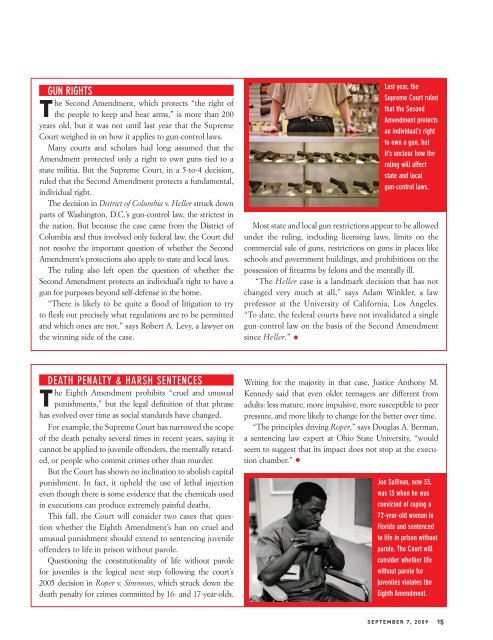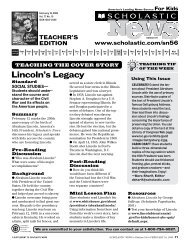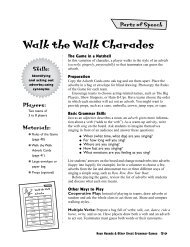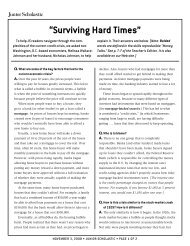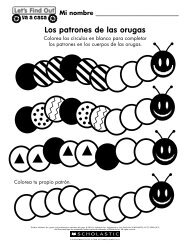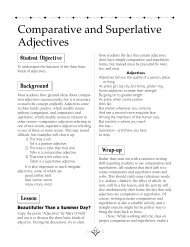3billion - Scholastic
3billion - Scholastic
3billion - Scholastic
Create successful ePaper yourself
Turn your PDF publications into a flip-book with our unique Google optimized e-Paper software.
t he<br />
Gun riGhts<br />
Second Amendment, which protects “the right of<br />
the people to keep and bear arms,” is more than 200<br />
years old, but it was not until last year that the Supreme<br />
Court weighed in on how it applies to gun-control laws.<br />
Many courts and scholars had long assumed that the<br />
Amendment protected only a right to own guns tied to a<br />
state militia. But the Supreme Court, in a 5-to-4 decision,<br />
ruled that the Second Amendment protects a fundamental,<br />
individual right.<br />
The decision in District of Columbia v. Heller struck down<br />
parts of Washington, D.C.’s gun-control law, the strictest in<br />
the nation. But because the case came from the District of<br />
Columbia and thus involved only federal law, the Court did<br />
not resolve the important question of whether the Second<br />
Amendment’s protections also apply to state and local laws.<br />
The ruling also left open the question of whether the<br />
Second Amendment protects an individual’s right to have a<br />
gun for purposes beyond self-defense in the home.<br />
“There is likely to be quite a flood of litigation to try<br />
to flesh out precisely what regulations are to be permitted<br />
and which ones are not,” says Robert A. Levy, a lawyer on<br />
the winning side of the case.<br />
t he<br />
death Penalty & harsh sentences<br />
Eighth Amendment prohibits “cruel and unusual<br />
punishments,” but the legal definition of that phrase<br />
has evolved over time as social standards have changed.<br />
For example, the Supreme Court has narrowed the scope<br />
of the death penalty several times in recent years, saying it<br />
cannot be applied to juvenile offenders, the mentally retarded,<br />
or people who commit crimes other than murder.<br />
But the Court has shown no inclination to abolish capital<br />
punishment. In fact, it upheld the use of lethal injection<br />
even though there is some evidence that the chemicals used<br />
in executions can produce extremely painful deaths.<br />
This fall, the Court will consider two cases that question<br />
whether the Eighth Amendment’s ban on cruel and<br />
unusual punishment should extend to sentencing juvenile<br />
offenders to life in prison without parole.<br />
Questioning the constitutionality of life without parole<br />
for juveniles is the logical next step following the court’s<br />
2005 decision in Roper v. Simmons, which struck down the<br />
death penalty for crimes committed by 16- and 17-year-olds.<br />
last year, the<br />
supreme court ruled<br />
that the second<br />
amendment protects<br />
an individual’s right<br />
to own a gun, but<br />
it’s unclear how the<br />
ruling will affect<br />
state and local<br />
gun-control laws.<br />
Most state and local gun restrictions appear to be allowed<br />
under the ruling, including licensing laws, limits on the<br />
commercial sale of guns, restrictions on guns in places like<br />
schools and government buildings, and prohibitions on the<br />
possession of firearms by felons and the mentally ill.<br />
“The Heller case is a landmark decision that has not<br />
changed very much at all,” says Adam Winkler, a law<br />
professor at the University of California, Los Angeles.<br />
“To date, the federal courts have not invalidated a single<br />
gun-control law on the basis of the Second Amendment<br />
since Heller.” •<br />
Writing for the majority in that case, Justice Anthony M.<br />
Kennedy said that even older teenagers are different from<br />
adults: less mature, more impulsive, more susceptible to peer<br />
pressure, and more likely to change for the better over time.<br />
“The principles driving Roper,” says Douglas A. Berman,<br />
a sentencing law expert at Ohio State University, “would<br />
seem to suggest that its impact does not stop at the execution<br />
chamber.” •<br />
Joe sullivan, now 33,<br />
was 13 when he was<br />
convicted of raping a<br />
72-year-old woman in<br />
Florida and sentenced<br />
to life in prison without<br />
parole. the court will<br />
consider whether life<br />
without parole for<br />
juveniles violates the<br />
eighth amendment.<br />
September 7, 2009 15


